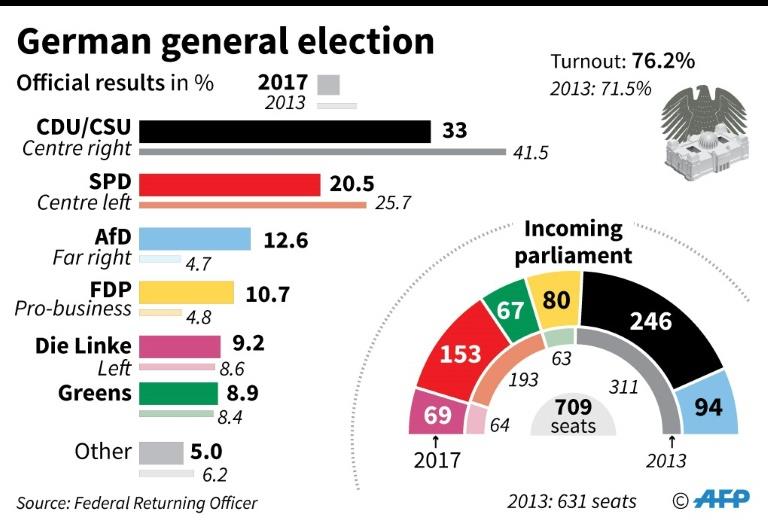
Hardliner Schaeuble to leave German finance ministry
The chief whip of Chancellor Angela Merkel's Christian Democrats (CDU) and his counterpart with their Bavarian sister party CSU said they had nominated the 75-year-old giant of the German political scene.
"We are pleased that Wolfgang Schaeuble agreed to stand for this office," Volker Kauder and Alexander Dobrindt said in a statement.
Schaeuble, 75, a longtime ally of Chancellor Angela Merkel, has been the eurozone's staunchest backer of austerity for stricken eurozone member states.
His unbending stance on Greece cast him as a villain in the struggle to save Athens from crashing out of the euro and many debt-mired countries in southern Europe will cheer his departure.
The general election on Sunday saw Merkel win a fourth term as German chancellor but without a ruling majority.
Her previous junior partners, the Social Democrats, said they would move to the opposition following a dismal result in the poll.
Merkel must now try to form a government likely to include the Free Democrats (FDP), which has already staked a claim to the powerful finance minister job.
- 'AfD tamer' -
FDP leader Christian Lindner, who could well be the prime candidate for the post, said that Schaeuble had his party's full backing to become speaker.
"Outstanding personality, natural authority," he tweeted.
The election also saw the hard-right nationalist Alternative for Germany (AfD) party win nearly 13 percent of the vote in what the top-selling Bild daily called a "political earthquake" for the country.
Bild said Merkel personally asked Schaeuble to lend his gravitas to the office of parliamentary speaker, arguing that the "job will have greater importance than usual given the arrival of the AfD in the Bundestag" lower house.
German media said he was slated to serve as the "AfD tamer".
Schaeuble is the longest serving member of the Bundestag with a 45-year tenure.
He will replace the highly respected Norbert Lammert, who retired at the end of the last parliamentary term this month.
The transition means however that Schaueble will no longer belong to Merkel's cabinet, or take part in what are expected to be thorny negotiations on a new coalition.
- 'Pitiless' -
Although Schaeuble occasionally broke protocol by publicly differing with Merkel during crises such as the eurozone debt turmoil and 2015's record refugee influx, she relied heavily on him as the most seasoned member of her inner circle.
He handed in Germany's first balanced budget in four decades in 2014, has met the same goal every year since. Germany will continue to run surpluses until 2021 according to the current fiscal plan.
Schaeuble, consistently one of Germany's most popular politicians, held five ministerial offices since 1984, forging his career under the former conservative leader Helmut Kohl.
Known for his biting wit and unerring sense of duty, he rose through the ranks to eventually become Kohl's chief of staff, long seen as the heir apparent.
Together they oversaw Germany's national reunification after the fall of the Berlin Wall. But personal tragedy struck Schaeuble with an assassination attempt by a deranged man in 1990 that badly injured him and has confined him to a wheelchair ever since.
He soon returned to active political life, but nearly sacrificed his career in a slush-fund scandal that shattered Kohl's reputation. After a period in the political wilderness, Schaeuble made a comeback in 2002.
While Merkel refused to back him two years later for the role of federal president -- instead picking former International Monetary Fund chief Horst Koehler -- he became interior minister the following year.
Schaeuble was criticised by civil liberties groups for curbing rights in response to the threat of extremist attacks.
However Merkel rewarded him in 2009 when she tapped him for the more high-profile finance ministry.
Describing himself as "pitiless" in his management of Germany's public purse, he showed the same exactitude towards his euro partners, campaigning for tight fiscal discipline and insisting on stringent conditions for any bailout contribution by Berlin.

Legal Disclaimer:
MENAFN provides the
information “as is” without warranty of any kind. We do not accept
any responsibility or liability for the accuracy, content, images,
videos, licenses, completeness, legality, or reliability of the information
contained in this article. If you have any complaints or copyright
issues related to this article, kindly contact the provider above.


















Comments
No comment